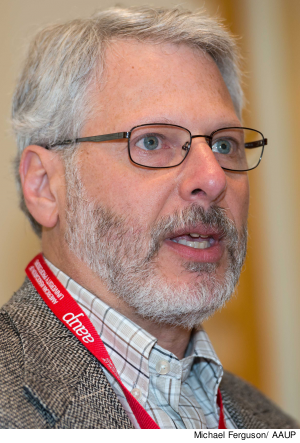Faced with a growing assault on shared governance and academic freedom, the American Association of University Professors elected a new leadership this spring that has vowed to emphasize grass roots organizing.
 |
Rudy Fichtenbaum, a professor of economics at Ohio’s Wright State University, won the race for AAUP president with 64% of the vote. He ran on the Organizing for Change slate, which promised to boost support for collective bargaining and other efforts to build the AAUP as a more activist organization.
PSC Vice President Steve London said the union supports the shift in priorities advocated by the new leadership.
“We’re looking for a stronger, more visionary AAUP,” London told Clarion. “We need that organization during this time of increasing corporatization.”
VENERABLE
Founded in 1915 by John Dewey, the American Association of University Professors has been a leading defender of academic freedom for decades. It has more than 48,000 members and over 300 chapters including roughly 70 chapters which operate under collective bargaining agreements that represent nearly 35,000 of the group’s members. The PSC pays dues on 1,000 memberships annually, which are held by members who are active in the union or faculty governance.
Fichtenbaum succeeds Cary Nelson, who had been the AAUP’s president since 2006 and could not run again due to term limits. Along with Fichtenbaum, other new officers from the Organizing for Change slate include First Vice President Hank Reichman, a history professor at California State University, East Bay; Second VP Susan Michalczyk, an adjunct at Boston College; and Secretary-Treasurer Michele Ganon, a professor of accounting at Western Connecticut State University.
Fichtenbaum has been active in the AAUP and faculty governance at his campus over the past two decades. He spoke at mass rallies and testified before the Ohio State legislature in early 2011 when the Republican majority voted for SB5, which eliminated collective bargaining rights for 350,000 public employees – including university faculty. He subsequently traveled the state building support for a November 2011 ballot referendum to repeal SB5, which voters approved by a landslide of 61% to 39%.
Fichtenbaum told Clarion that Organizing for Change will bring the same passion for organizing and mobilizing to the AAUP.
“Working in a coalition with others is what allowed us to be successful,” said Fichtenbaum, who wants to make organizing the membership central to the group’s work. “Being organized is what gives you power,” he added.
In addition to building more collective bargaining chapters and strengthening existing ones, Organizing for Change promised during its campaign to build AAUP membership among all academics, including tenure- and non-tenure-track faculty, graduate students, librarians and advisors.
NEW REALITIES
“These folks recognize that the AAUP needs to pay attention to the reality of the faculty as it actually exists,” added PSC Vice President for Community Colleges Anne Friedman, who was a part of a delegation of PSC activists that attended the AAUP’s June national convention in Washington, D.C.
Elected to the Executive Committee (EC) of the AAUP’s National Council, Friedman is the only EC member who comes from a community college. She previously served 12 years on the AAUP’s Community College Council. “The same issues of academic freedom and tenure affect us, too,” Friedman said.
Historically, the AAUP has played a strong role in setting standards for academic freedom and calling individual colleges and universities to account when they violate these standards. However, many members have voiced concern that the organization was not responding effectively enough to more systemic attacks on shared governance and academic freedom, which have grown as corporate models of management have become the norm in academe.
Debate over the direction of the organization intensified in the last year when AAUP General Secretary Gary Rhoades was forced out by Nelson. Rhoades had helped organize new collective bargaining chapters in Illinois, Ohio and Oregon, and the AAUP’s Collective Bargaining Conference had criticized the process that led to his departure. The success of Organizing for Change is seen by many as a validation of Rhoades’s emphasis on collective bargaining and on organizing at the base.
Though Nelson had endorsed Fichtenbaum’s opponent Irene Mulvey, a professor at Fairfield University, after the vote he said that the new president was well-positioned to strengthen the AAUP’s collective bargaining work. “I hope they also support the traditional strengths that define what the AAUP is: Committee A policy statements and reports [on academic freedom], amicus briefs from the legal department, recruitment of new members devoted to our core principles, and government relations work,” Nelson told Inside Higher Ed.
CORE VALUES
“There are private institutions where having a union might not be possible but we can still have collective action to defend academic freedom and shared governance,” Fichtenbaum responded in an IHE interview. “What is the best way to achieve academic freedom, shared governance and protect economic interests of faculty members? I think the answer is being an organization of activists, where the core values of the AAUP remain a centerpiece.”
“We have to organize ourselves and demand that our policies and standards be enforced,” Fichtenbaum told Clarion. “It’s not just about protecting a bunch of professors. It’s about protecting the public interest.”

